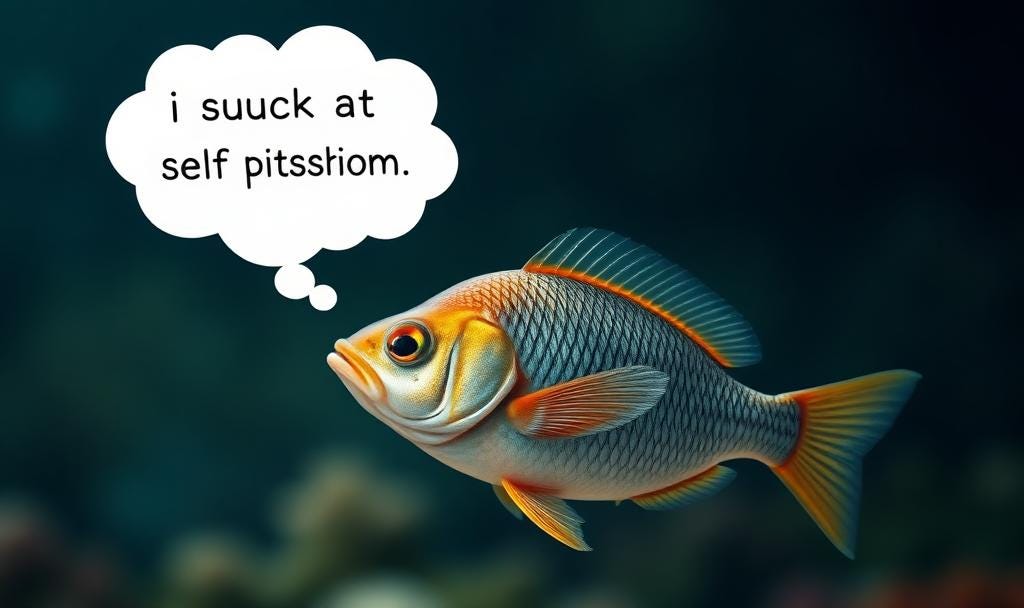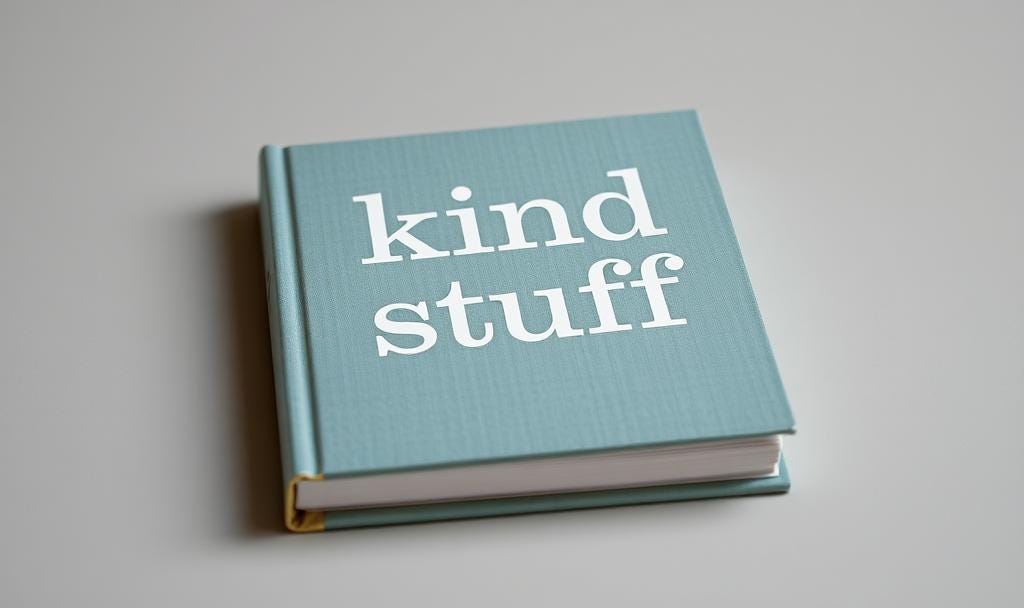Three practical ways to grow your self-compassion
Or, how to improve your life satisfaction without accomplishing anything else
Dr. Margaret Rutherford and I had a lovely conversation on her extremely useful show, The SelfWork Podcast. Listen in to hear her 30 years of wisdom and experience as a clinical psychologist!
Now, on with the newsletter!
Hello everyone!
Those of us wired to be perfectionistic set high expectations for ourselves—we go big! But that means we might expect ourselves to finish our work in one sitting, keep the house guest-ready, or feel calm and centered all the time.
As always, our high standards are not the problem: of course we want to be productive, have a clean house, and feel good!
The problems come when we expect ourselves to meet our high standards under every circumstance, we make our self-worth contingent upon meeting our standards, or we beat ourselves up when we fall short.
Fortunately, there is a one-size-fits-all solution to any of these three: self-compassion.

In the last newsletter, we talked about the link between perfectionism and chronic dissatisfaction—how being hard on ourselves makes us dissatisfied with our lives regardless of what we’ve objectively achieved.
However, add in self-compassion, and that link weakens or even disappears. In other words, perfectionism only makes us dissatisfied with life because it lowers our self-compassion.
But let’s back up; first, a quick definition:
Self-compassion is a sensitivity to one’s own suffering, plus a commitment to try to alleviate or prevent that suffering.
It seems straightforward. Who wouldn’t want to be kind to themselves? But for those of us who are used to using self-criticism (“What is wrong with me?”), self-coercion (“I just have to”), or self-punishment (“I got distracted so now I should study twice as long”) as the engine to our forward movement, we may get anxious or despairing at the prospect of easing up and being kinder to ourselves. We worry if we’re not hard on ourselves, we’ll fall behind, fail at everything we do, or lose what made us who we are today.
But self-compassion doesn’t mean eating bonbons in a bubble bath. Nor will it change our fundamental personalities. Our standards, work ethic, energy, and drive will remain exactly the same. They’re all part of who we are and they won’t be cancelled out by being kinder to ourselves. You’re not going to stop getting everything done that needs to get done; you’re just changing the tone of how it gets done.
Therefore, this week, for whatever reason you choose, let’s try out a few methods that pump up our self-compassion.
With that, here are three ways I’ve seen self-compassion actually work with clients. We’ll go from the most structured and concrete to the most qualitative and fuzzy.
A nice-to-yourself journal.
For all you careful archivists of life out there: behold a journal prompt!
Make a list (short, long, whatever works!) of moments you offered yourself care, kindness, patience, understanding, or courage. Focus on the process rather than the outcome.
For example, make a note of how you pivoted today’s to-do list when one task unexpectedly took four hours rather than expecting yourself to shoehorn everything. Write down the fact you had a hard conversation with your mother and just let it be hard rather than chiding yourself about how it shouldn’t be hard. Jot down the fact you let yourself skip your 5 PM gym class because you were falling asleep at your desk after lunch and realized you’re exhausted.
Try not to focus on any “success” or productivity that your self-kindness may or may not have led to. Simply record the times you were kind to yourself in word, tone, or deed.
Why is writing these moments down helpful? Many reasons, but I’ll highlight one in particular:
If you know you’re on a mission to record incidents of self-kindness or self-gentleness or self-whatever-is-working-better-than-the-usual-perfectionism, you’ll be on the lookout for those moments and opportunities. And if you look for them, not only will you find them, but you’ll find yourself creating more of these moments so you can write them down.
Or in other words, intention spurs action.
Move from “I have to” to “I choose to.”
Those of us familiar with perfectionism are highly conscientious. We have a strong sense of how things “should” be. But that means that we drive ourselves hard with the grind of “should,” “have to,” and “got to.” One of my clients even considered getting a tattoo of her academic mentor’s face to keep her focused on the “have tos” of scholarly productivity (spoiler: she didn’t end up getting the tattoo, but her labmate did).
This conscientious drive is useful in many ways, but too many “shoulds” end up feeling coercive, obligatory, or dutiful.
Eventually, we get resentful. We balk. We rebel. And then we procrastinate, avoid, or get sucked into unproductive self-soothing (read: stress-eating cold pizza over the sink—we’ve all been there.)
Now, traditionally the opposite of “have to” is “want to.” But substituting “wants” for “shoulds: one-to-one doesn’t work. We live in the real world where there are emails to answer, dentist appointments to make, and kids who have managed to lose one shoe (how??).
Instead of trying to force yourself into action with “have to,” search within that task for a whiff of “choose to.”
Note: we can’t gaslight ourselves into this by hissing through clenched teeth, “I choose to wash the dishes.”
Instead, is there anything about the task that you find meaningful, important, or fun?
In How to Be Enough, I wrote about my resentment at having to slog through my email inbox. However, when I focus on my relationships to the individuals in my inbox, I can feel the quality of my experience start to shift. Rather than approaching my email with resentful resistance, I start to feel some agency, some choice: I choose to answer my emails because I care about the people on the other end of the subject lines.
In your case, you might shift from “I have to clean the kitchen” to choosing to tidy because you know less clutter would help you feel calm and focused.
You might shift from “I’ve gotta get some exercise” to choosing to go for a walk because you actually do want to soak up the beautiful weather before winter sets in.
How do you know if you’ve switched from “should” to “choose”? Only you can tell: it’s when it feels lighter, looser, and less like a chore.
“Yes, and…”
Famously, this is the cardinal rule of improv comedy. You accept what your scene partner offers, even if it’s weird or off the wall. If someone says, “Oh no, the floor turned into hot mayonnaise!” you don’t deny it. You accept that the floor is hot mayonnaise. This is the “yes.”
Next is the “and.” You add to it. You say, “Here, we can use these croutons as stepping stones!”
This is also a good way to approach our inner critic, except you don’t “yes” your inner critic literally. When your inner critic scolds, “You’re always so forgetful! You have the memory of a goldfish!” you’re not “yes”-ing the content of the criticism. Instead, you “yes” your critic by acknowledging its presence:
“Here it is.”
“Oh, this voice.”
“Ah, this is what happens.”
Then, “and.” Add to it by acknowledging what matters, despite the critic.
“And I can still be nice to myself.”
“And I know I did what I can do,”
“And I showed up to help people,”
“And I am worthy of receiving kindness.”
It all adds up to a little bit of mindfulness (“yes”) plus some self-compassion (“and”).
To sum it all up, being kinder and more compassionate to ourselves not only feels better than the sting of the inner critic, it also makes us more satisfied with ourselves and our lives, without having to accomplish or achieve anything new.
So keep track of the moments you manage to be kind to yourself—if you look for them, you’ll find them. Seek out the sense of choice hidden in your tasks. Finally, treat your inner critic like an eccentric improv partner who doesn’t quite get it: acknowledge it, be kind, and then keep building the scene (read: life) you want to be in.
As always, be kind to others and yourself!
Did you find this note from me useful? If so, please share it with one person you care about. Even in our digital world, a word of mouth recommendation is still the most valuable. Hey, there’s a button right there!









I first learned about self-compassion when I read Kristin Neff's book years ago, and it was transformative. A decade later, I am so much kinder to myself and it's such a relief. I'm kinder to everyone, actually. I didn't realize that being so judgmental of myself would spill over into how I treated other people, but I think it did.
I love that you kept the oddly spelled fish illustration, in keeping with the theme of the post! Delightful!